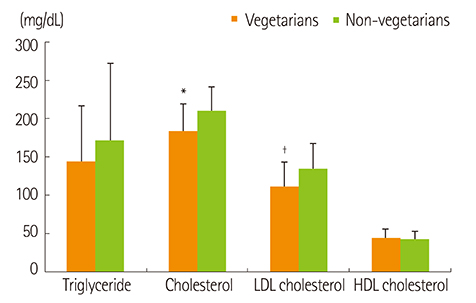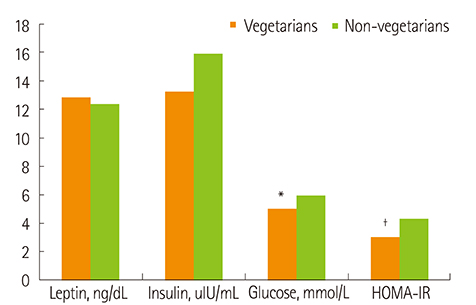Clin Nutr Res.
2015 Jul;4(3):175-181. 10.7762/cnr.2015.4.3.175.
Comparative Study of Serum Leptin and Insulin Resistance Levels Between Korean Postmenopausal Vegetarian and Non-vegetarian Women
- Affiliations
-
- 1Department of Food and Nutrition, Korea National University of Transportation, Jeungpyeong 368-701, Korea.
- 2Division of Food Science and Culinary Arts, Shinhan University, Uijeongbu 480-701, Korea. byj@shinhan.ac.kr
- KMID: 2148627
- DOI: http://doi.org/10.7762/cnr.2015.4.3.175
Abstract
- The present study was conducted to compare serum leptin and insulin resistance levels between Korean postmenopausal long-term semi-vegetarians and non-vegetarians. Subjects of this study belonged to either a group of postmenopausal vegetarian women (n = 54), who maintained a semi-vegetarian diet for over 20 years or a group of non-vegetarian controls. Anthropometric characteristics, serum leptin, serum glucose, serum insulin, insulin resistance (HOMA-IR; Homeostasis Model Assessment of Insulin Resistance), and nutrient intake were compared between the two groups. The vegetarians showed significantly lower body weight (p < 0.01), body mass index (p < 0.001), percentage (%) of body fat (p < 0.001), and serum levels of leptin (p < 0.05), glucose (p < 0.001), and insulin (p < 0.01), than the non-vegetarians. The HOMA-IR of the vegetarians was significantly lower than that of the non-vegetarians (p < 0.01) after adjustment for the % of body fat. A long-term vegetarian diet might be related to lower insulin resistance independent of the % of body fat in postmenopausal women.
Keyword
MeSH Terms
Figure
Reference
-
1. Statistics Korea. 2013 Life tables. Dajeon: Statistics Korea;2014.2. Le LT, Sabaté J. Beyond meatless, the health effects of vegan diets: findings from the Adventist cohorts. Nutrients. 2014; 6:2131–2147.
Article3. Ferdowsian HR, Barnard ND. Effects of plant-based diets on plasma lipids. Am J Cardiol. 2009; 104:947–956.
Article4. Flock MR, Green MH, Kris-Etherton PM. Effects of adiposity on plasma lipid response to reductions in dietary saturated fatty acids and cholesterol. Adv Nutr. 2011; 2:261–274.
Article5. Yang SY, Zhang HJ, Sun SY, Wang LY, Yan B, Liu CQ, Zhang W, Li XJ. Relationship of carotid intima-media thickness and duration of vegetarian diet in Chinese male vegetarians. Nutr Metab (Lond). 2011; 8:63–69.
Article6. Chiang JK, Lin YL, Chen CL, Ouyang CM, Wu YT, Chi YC, Huang KC, Yang WS. Reduced risk for metabolic syndrome and insulin resistance associated with ovo-lacto-vegetarian behavior in female Buddhists: a casecontrol study. PLoS One. 2013; 8:e71799.
Article7. Agrawal S, Millett CJ, Dhillon PK, Subramanian SV, Ebrahim S. Type of vegetarian diet, obesity and diabetes in adult Indian population. Nutr J. 2014; 13:89–106.
Article8. Kahleova H, Matoulek M, Malinska H, Oliyarnik O, Kazdova L, Neskudla T, Skoch A, Hajek M, Hill M, Kahle M, Pelikanova T. Vegetarian diet improves insulin resistance and oxidative stress markers more than conventional diet in subjects with Type 2 diabetes. Diabet Med. 2011; 28:549–559.
Article9. Grundy SM. Hypertriglyceridemia, insulin resistance, and the metabolic syndrome. Am J Cardiol. 1999; 83:25F–29F.
Article10. Mikhail N. The metabolic syndrome: insulin resistance. Curr Hypertens Rep. 2009; 11:156–158.
Article11. Arisawa K, Uemura H, Yamaguchi M, Nakamoto M, Hiyoshi M, Sawachika F, Katsuura-Kamano S. Associations of dietary patterns with metabolic syndrome and insulin resistance: a cross-sectional study in a Japanese population. J Med Invest. 2014; 61:333–344.
Article12. Friedewald WT, Levy RI, Fredrickson DS. Estimation of the concentration of low-density lipoprotein cholesterol in plasma, without use of the preparative ultracentrifuge. Clin Chem. 1972; 18:499–502.
Article13. Matthews DR, Hosker JP, Rudenski AS, Naylor BA, Treacher DF, Turner RC. Homeostasis model assessment: insulin resistance and beta-cell function from fasting plasma glucose and insulin concentrations in man. Diabetologia. 1985; 28:412–419.
Article14. Hung CJ, Huang PC, Li YH, Lu SC, Ho LT, Chou HF. Taiwanese vegetarians have higher insulin sensitivity than omnivores. Br J Nutr. 2006; 95:129–135.
Article15. McCarty MF. Vegan proteins may reduce risk of cancer, obesity, and cardiovascular disease by promoting increased glucagon activity. Med Hypotheses. 1999; 53:459–485.
Article16. Kuo CS, Lai NS, Ho LT, Lin CL. Insulin sensitivity in Chinese ovo-lactovegetarians compared with omnivores. Eur J Clin Nutr. 2004; 58:312–316.
Article17. Tonstad S, Butler T, Yan R, Fraser GE. Type of vegetarian diet, body weight, and prevalence of type 2 diabetes. Diabetes Care. 2009; 32:791–796.
Article18. Amini M, Esmaillzadeh A, Shafaeizadeh S, Behrooz J, Zare M. Relationship between major dietary patterns and metabolic syndrome among individuals with impaired glucose tolerance. Nutrition. 2010; 26:986–992.
Article19. Gadgil MD, Anderson CA, Kandula NR, Kanaya AM. Dietary patterns in Asian Indians in the United States: an analysis of the metabolic syndrome and atherosclerosis in South Asians Living in America study. J Acad Nutr Diet. 2014; 114:238–243.
Article20. Berkow SE, Barnard N. Vegetarian diets and weight status. Nutr Rev. 2006; 64:175–188.
Article21. Burke LE, Styn MA, Steenkiste AR, Music E, Warziski M, Choo J. A randomized clinical trial testing treatment preference and two dietary options in behavioral weight management: preliminary results of the impact of diet at 6 months--PREFER study. Obesity (Silver Spring). 2006; 14:2007–2017.
Article22. Miller WC, Niederpruem MG, Wallace JP, Lindeman AK. Dietary fat, sugar, and fiber predict body fat content. J Am Diet Assoc. 1994; 94:612–615.
Article23. Appleby PN, Thorogood M, Mann JI, Key TJ. Low body mass index in non-meat eaters: the possible roles of animal fat, dietary fibre and alcohol. Int J Obes Relat Metab Disord. 1998; 22:454–460.
Article24. Spencer EA, Appleby PN, Davey GK, Key TJ. Diet and body mass index in 38000 EPIC-Oxford meat-eaters, fish-eaters, vegetarians and vegans. Int J Obes Relat Metab Disord. 2003; 27:728–734.
Article25. Valachovicová M, Krajcovicová-Kudlácková M, Blazícek P, Babinská K. No evidence of insulin resistance in normal weight vegetarians. A case control study. Eur J Nutr. 2006; 45:52–54.26. Sabaté J, Ratzin-Turner R. Vegetarian nutrition. 1st ed. Boca Raton (FL): CRC Press;2001.27. Craig WJ. Health effects of vegan diets. Am J Clin Nutr. 2009; 89:1627S–1633S.
Article28. Barnard ND, Cohen J, Jenkins DJ, Turner-McGrievy G, Gloede L, Jaster B, Seidl K, Green AA, Talpers S. A low-fat vegan diet improves glycemic control and cardiovascular risk factors in a randomized clinical trial in individuals with type 2 diabetes. Diabetes Care. 2006; 29:1777–1783.
Article29. Dominique Ashen M. Vegetarian diets in cardiovascular prevention. Curr Treat Options Cardiovasc Med. 2013; 15:735–745.
Article30. Fu CH, Yang CC, Lin CL, Kuo TB. Effects of long-term vegetarian diets on cardiovascular autonomic functions in healthy postmenopausal women. Am J Cardiol. 2006; 97:380–383.
Article31. Huang YW, Jian ZH, Chang HC, Nfor ON, Ko PC, Lung CC, Lin LY, Ho CC, Chiang YC, Liaw YP. Vegan diet and blood lipid profiles: a cross-sectional study of pre and postmenopausal women. BMC Womens Health. 2014; 14:55–60.
Article32. Wu L, Ma D, Walton-Moss B, He Z. Effects of low-fat diet on serum lipids in premenopausal and postmenopausal women: a meta-analysis of randomized controlled trials. Menopause. 2014; 21:89–99.
Article33. Hotta K, Funahashi T, Bodkin NL, Ortmeyer HK, Arita Y, Hansen BC, Matsuzawa Y. Circulating concentrations of the adipocyte protein adiponectin are decreased in parallel with reduced insulin sensitivity during the progression to type 2 diabetes in rhesus monkeys. Diabetes. 2001; 50:1126–1133.
Article34. Barr VA, Malide D, Zarnowski MJ, Taylor SI, Cushman SW. Insulin stimulates both leptin secretion and production by rat white adipose tissue. Endocrinology. 1997; 138:4463–4472.
Article35. Kieffer TJ, Habener JF. The adipoinsular axis: effects of leptin on pancreatic beta-cells. Am J Physiol Endocrinol Metab. 2000; 278:E1–E14.36. Sabaté J. The contribution of vegetarian diets to health and disease: a paradigm shift? Am J Clin Nutr. 2003; 78:502S–507S.
Article37. Wolfram T, Ismail-Beigi F. Efficacy of high-fiber diets in the management of type 2 diabetes mellitus. Endocr Pract. 2011; 17:132–142.
Article
- Full Text Links
- Actions
-
Cited
- CITED
-
- Close
- Share
- Similar articles
-
- A Comparative Study of Dietary Mineral Intake Status and Serum Mineral Concentrations of Postmenopausal Vegetarian Women with those of the Omnivores
- Differences between the Food and Nutrient Composition of the Vegetarian and Non-vegetarian Menus of Elementary School Foodservices in Chungnam
- Comparison of Antioxidant Level of the Elderly Living in Institutions: Vegetarian and Non-vegetarian Diet
- Vegetarian Diet for Cardiovascular Disease Risk Reduction: Cons
- The Study of Pytoestrogen Intake and Bone Mineral Density of Vegetarian and Nonvegetarian Postmenopausal Women




